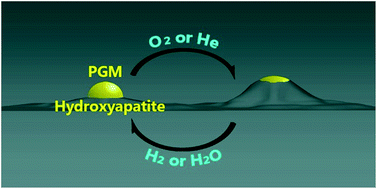Oxidative strong metal–support interactions (OMSI) of supported platinum-group metal catalysts†
Abstract
Supported platinum-group metal (PGM) catalysts are widely used in many important industrial processes. Metal–support interaction is of great importance in tailoring their catalytic performance. Here, we report the first example of oxidative strong metal–support interactions (OMSIs) between PGM and hydroxyapatite (HAP) which can be extended to PGM and ZnO. It occurred under high-temperature oxidation conditions accompanied by the encapsulation of PGM by HAP and electron transfer between PGM and HAP. With this OMSI, the aggregation and leaching of PGMs were significantly inhibited, resulting in an excellent catalytic stability and much improved reusability of supported Pt and Pd catalysts, respectively. This is the first time to find that PGMs can manifest OMSI which benefits the stabilization of PGM catalysts under oxidative reaction conditions. This new type of SMSI not only contributed to a deeper understanding of SMSI but also provided a new way to develop new stable PGM catalysts.



 Please wait while we load your content...
Please wait while we load your content...